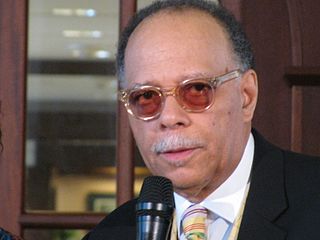A Quote by Haki R. Madhubuti
Studies that bring clarity and direction to the black male situation as an integral part of the black family/community are unpopular, not easy to get published and very dangerous.
Related Quotes
One of the facets of growing up the way I did, I never had the experience of being solely in the black community. Even my family, my mother is what they call Creole, so she's part French, part black, and grew up in Louisiana. It's a very specific kind of blackness that is different than what is traditionally thought of as the black community and black culture. So, I never felt a part of whatever that was.
I would say I'm black because my parents said I'm black. I'm black because my mother's black. I'm black because I grew up in a family of all black people. I knew I was black because I grew up in an all-white neighborhood. And my parents, as part of their protective mechanisms that they were going to give to us, made it very clear what we were.
I felt like it was a courageous show [Black-ish] from the beginning. We are a black family - we're not a family that happens to be black. But the show is not even about us being black. The show is about us being a family. That is groundbreaking - on TV, the black characters either happen to be black or they're the "black character," where everything they say is about being black. I think that's the genius.
You have to know the forces that are against you and that are trying to break you down. We talk about the problems facing the black community: the decimation of the black family; the mass incarceration of the black man; we're talking about the brutality against black people from the police. The educational system.
Within the lesbian community I am Black, and within the Black community I am a lesbian. Any attack against Black people is a lesbian and gay issue, because I and thousands of other Black women are part of the lesbian community. Any attack against lesbians and gays is a Black issue, because thousands of lesbians and gay men are Black. There is no hierarchy of oppression.
Each of us, helplessly and forever, contains the other - male in female, female in male, white in black, and black in white. We are part of each other. Many of my countrymen appear to find this fact exceedingly inconvenient and even unfair, and so, very often, do I. But none of us can do anything about it.
I would say except when I have been attacked the black community has seldom seen fit to even mention the gay aspect. And since when I have been attacked I have usually been defended by the black community, I would say that the black newspapers have played it very straight. If I was attacked they simply published that I was attacked, if I was defended they simply said I had been defended. But I don't think they have taken any effort at maligning me or maligning gays or making any effort to give to people anything that wasn't news.


































